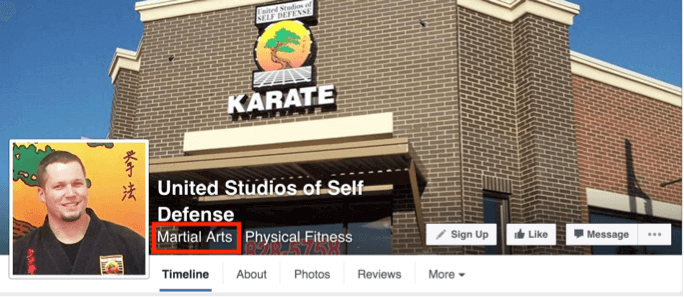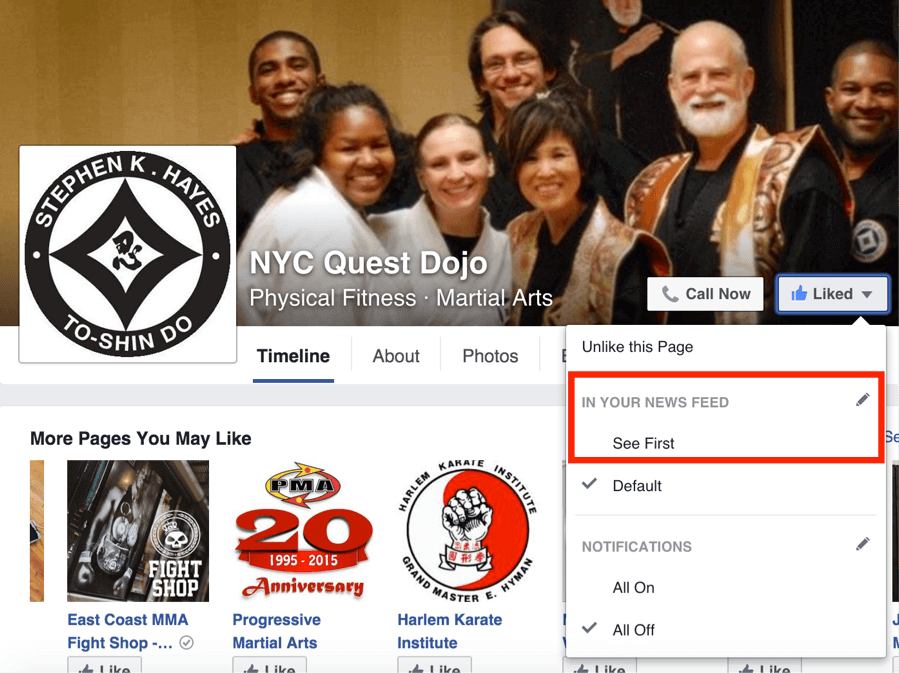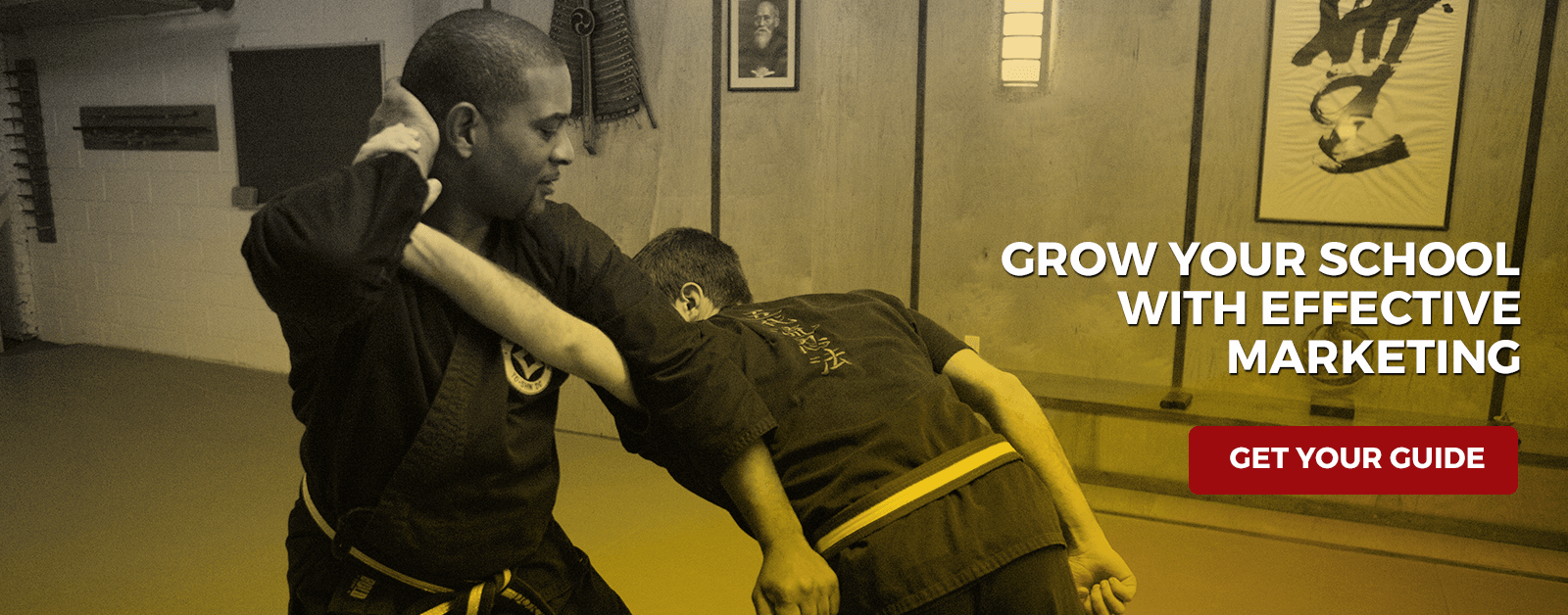4 Martial Arts Social Media Marketing Tips for School Owners


To be successful, you must have a social media presence. We know that’s a bold statement, but it’s the truth. What started out as a place to post updates on life and connect with friends has evolved into a global business market place. It’s a place for consumers to discover new products and services and then conduct research before making a buying decision. To make sure you’re using social media to its fullest potential for your school, we pulled together a list of the current best practices for your social strategy.
1). Fully Optimize Your Page
Each social network is different, so each of your profiles will be unique. Ideally, you want to provide as much information as possible about your school to help persuade prospective students to try you out. If the information you provide is incomplete or not compelling, you risk losing business to a competitor. (Remember, prospective students not only find out about you on social media, but they will use social to check you out before reaching out to you.)
Get your copy of our free 10-Step Martial Arts Marketing Guide for tips on promoting your school!
Facebook is consistently the most popular social network with the best features for small business advertising, so we recommend that you get started by concentrating your social media presence and strategy solely on Facebook. To get started, here are the basic elements you need to build out your Facebook business page. Even if you created your Facebook page years ago, you might need to go back and add to it since business features have expanded.
- Short Description: You only have 255-characters in the section to describe your school, so explain your style of classes and note your general location here. If it fits in the space, you can also include a promotion (i.e.: Try your first week free!).
- Long Description: This is where you’ll tell prospects how amazing your school is. Talk about your facility, the programs you offer, your community and anything else a prospect should know.
- Hours: Make sure to keep an updated schedule posted here.
- Contact Information: List your physical address, phone number and email address.
- Website: Provide a link to your website if you have one (and you should).
- Business Category: Underneath the name of your business, you’ll see the option to add a business category. Be sure to select Martial Arts.

- Reviews: Ask your students and parents to post reviews about your school. Reviews go a long way towards building trust in you and your school.
- Photos: As they say, a picture is worth a thousand words. Be sure to use clear and interesting images for your cover image, profile picture and other photos you share.
2). Connect with Your Students
After building your profile, you’ll want to work on connecting with prospective and current students. Each time you talk to a prospect and sign them in to your dojo software, tell them to Like your school’s Facebook. Make sure all of your students Like your page too by posting reminders in your newsletters, email communications and website. You can also add social media icons to any of your printed materials. Continually asking to connect may feel redundant, but it’s not.
To make sure your Facebook followers see your posts, tell them to set your posts to “see first” in their Facebook news feed. They can do that by hovering over the “Like” button on your cover image. Hovering will allow them to select either “see first” or see as “default.”

3). Share the Right Content
In recent studies, nearly 80% of people said that the things a business posts on social media influences what they buy. That means your social content can drive prospects into your school or away to a different business.

There’s one very important rule when it comes to your Facebook posts, and it’s this: don’t let every post be about you or your business. If you just share information targeted at selling student agreements to prospective students, your followers will eventually tune your posts out or even unfollow your page. Instead, post helpful and engaging content to keep your followers interested. Share blog posts you’ve written, as well as links to articles that will enhance your current and prospective student’s training. Post photos of your students, and offer training tips, humor and inspiration.
If you want to make sure you’re keeping your posts balanced, hold self-promotion to about 50% of your content. Self-promotional posts are direct links to your website, special offers, school announcements and other lead generating content.
Finally, it’s important to mention that quality content is more important than the quantity of content you post. If you make sure all your posts have value, your followers will remain interested. But if your posts veer off towards filler content, you’ll be at risk of losing your audience.
4). Encourage Engagement
Although we’ve mostly talked about lead generation, the value in social media doesn’t end once a student signs an agreement. Social media also helps with student retention. Through pages and private groups, you can strengthen relationships with your students and provide a place for them to interact with one another outside of your school.
To maximize the retention value in social media, try to generate follower participation and engagement. When you post content, ask for feedback and encourage a dialogue. Ask your followers open-ended questions about things they are interested in and tell them to tag themselves if they are in any photos your post. Do what it takes to get your followers talking and posting on your pages.
But be sure to regularly monitor your accounts and reply to comments and questions as they are posted or sent through messenger. Nothing will kill engagement quicker than your lack of interest in what your followers have to say.
You can also create a private Facebook group for your students. With groups, your posts will automatically appear in group members’ News Feeds. This ensures all group members stay up-to-date on events, and it helps members feel safe (from a privacy standpoint) to share information and updates with each other. But remember, since groups are private, they aren’t a useful lead generation tool.
If you’re interested in other ways to attract new students and grow your school, get your copy of our 10 Step Marketing Guide for Martial Arts Schools.

I’m Coach Kelli, a devoted CrossFit gym owner with 15 years of experience managing my facility, along with owning yoga studios and wellness centers. Beyond the fitness world, I have a passion for cooking, cherish moments with my children and family, and find joy in spending time outside. Having experienced the highs and lows, I’m dedicated to leveraging my expertise to help you grow and succeed on your fitness journey.

I’m Coach Kelli, a devoted CrossFit gym owner with 15 years of experience managing my facility, along with owning yoga studios and wellness centers. Beyond the fitness world, I have a passion for cooking, cherish moments with my children and family, and find joy in spending time outside. Having experienced the highs and lows, I’m dedicated to leveraging my expertise to help you grow and succeed on your fitness journey.




